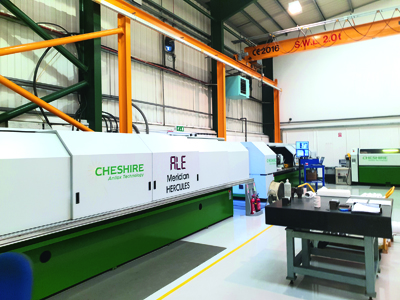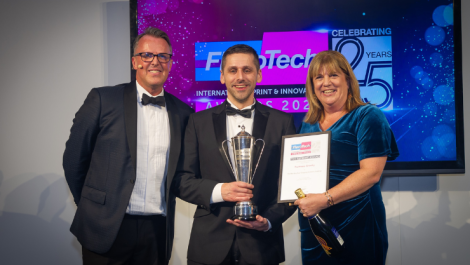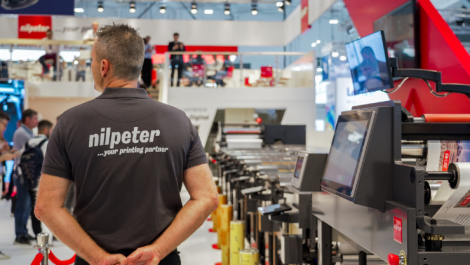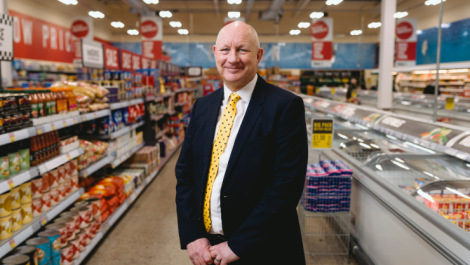The laser room where the anilox rollers are engraved
Recent years have been bountiful for Cheshire Anilox Technology and with sales still going through the roof, the company has invested in some new equipment and is already seeing the benefits. Michal Lodej went to see the new kit himself.
Striking while the iron is hot, Cheshire Anilox Technology, based in Dukinfield, Greater Manchester, has continued its investment and expansion programme by installing a new CNC machine, allowing the company to manufacture the rollers they engrave for the narrow web market.
Sonia Arcos, sales director, explained, ‘The new machine was bought to meet the growth we have been experiencing. This is our 26th year in business and with profit and turnover increasing we are happy to invest back into the business to strengthen our position. These machines also help our productivity as we are no longer reliant on our suppliers. It has given us the flexibility to cater to last minute orders from customers who are in an emergency and need something quickly.’
The company has seen growth in the narrow web market but has seen stronger growth in the flexible packaging arena, where the impact of digital has not been so great and where many companies are switching from gravure to flexo.
The company has always had strong export sales, and this is something which has continued to improve. With the strength in export sales, the company is closely watching the Brexit negotiations. ‘It is difficult to say at the moment about Brexit. A no deal exit from the European Union would be a problem for us, but I can’t see a return to import duties. Having said that, we have a lot of customers in South America and Asia to warrant our recent investments.’
Like a lot of UK manufacturers, Cheshire experienced a lift in export sales when the value of the pound dropped after the vote as it made UK companies much more competitive abroad.
Speaking the lingo
Being more competitive abroad helps a little, but there is more competition within the UK. ‘When producing anilox rollers and sleeves there are a lot of competitors, not just in the wider market, but specifically in this country. This competition helps us to stay sharp and better as it is easier for customers to go to a new supplier, so we have to be the best at what we do,’ continued Ms Arcos.
‘We are a multi lingual company, which helps us to remain customer service driven, even to the point where we pay for staff to have foreign language lesson for anyone who is willing to learn. It makes a difference being able to speak the language of a Russian customer or to speak Spanish to our South American customers. If you consider that they are buying a product from thousands of miles away, they will be far more comfortable about that if they feel they can communicate well with the supplier.’
‘Having long term serving staff members makes a real difference especially in an engineering facility as these sorts of jobs cannot be learnt overnight, said Paul Smith, managing director. ‘Engineers don’t grow on trees like they used to and the best ones are really hard to get hold of. So now we have started employing younger people and training them up ourselves, but we have to make sure they have the right attitude. Attitude is the most important thing, skills can be taught later.’
The investment plans for the company are showing no sign of stopping for the company. Only after installing the CNC machine and getting up and running did Cheshire realise how easy it was able to fill it with work and so another is on the horizon for next year.
Of course all this extra equipment requires more space, and so there are also plans to expand its current site to make more room for the new additions.

Inside Cheshire’s new CNC machine where it constructs roller bases
Day to day
Not only does Cheshire make anilox rollers from scratch, the company also repairs them, especially the larger ones. These base rollers can be expensive and so for many companies it can make more economic sense to send them for repair as opposed to buying them new.
But for those in the narrow web sector, the CNC machine is up and running and turns solid blocks of steel into perfectly formed roller bases. Before the machine was installed, the company had to rely on having these bases sent in from a supplier.
Ms Arcos explained, ‘Having the CNC machine is all about having more control over what we produce, in terms of the materials used, the quality its made to and the time we need it by.’
The quality control area uses high tech measuring equipment by interferometry to analyse the surface of ever anilox roller, at screen generation and after it has been engraved and polished, to make sure it is manufactured to maximum accuracy.
Even when using high tech lasers, there is always human interaction at some point and so everything needs to be double checked. The measuring device Cheshire uses not only inspects the size of the cell to calculate cell volume, but it also takes a 3D image to analyse the true shape of the cell, and therefore check that it will release the ink properly too.
The ceramic coating represents a critical part of the anilox roller as it affects the consistency of the engraving and most importantly its longevity. There are many variables in the plasma spray process which determine the coating quality.
Cheshire uses The Triplex Pro plasma for the anilox coating application. With this robotically operated machine, the company can control the critical parameters in the plasma process to achieve a consistent, extremely dense and wear resistant ceramic.
‘After the ceramic coating process, all rollers are treated with SealTec,’ explained Ms Arcos, ‘This is a highly advanced sealant specially developed by Cheshire Anilox Technology to reduce porosity to extraordinary low levels (<0.5%) and offer the maximum protection against corrosion.’
After the rollers are sealed they are diamond ground and polished. Smoothness is a very important aspect of the engraving quality and consistency. As part of the finishing process, every anilox surface is measured and the Roughness Average (RA) recorded. The lower the RA measurement, the smoother the finish. Every Anilox roller manufactured by Cheshire, regardless of specification, must have a RA of 0.3 or lower before engraving take place.
After the surface roughness is checked, it is time for the cell structures to be engraved by laser. The company’s newest laser, like all its lasers, is manufactured by British company ALE. The machines are able to generate a custom pulse so are able to engrave any pattern or design. It uses a constant beam which provides greater control of the laser beam producing cell profiles with well-defined tops, smoother walls and wider cell bottoms that improve the ink release properties and consistency of the anilox engraving.
After engraving, the roller is polished as the effect of the laser beam on the ceramic will create recast and change the texture of the surface. Then once polished the roller is again measured by interferometry to make sure the cell structure and volume will meet the customer’s requirements.
No matter what the future will bring Cheshire Anilox Technology has invested in the equipment which allows it to be more flexible and to take supply matters into its own hands. The future of the business was always at the forefront of the decision to make these investments as growth is always the aim. Mr Smith concluded, ‘After 26 years of trading we have built up a good customer base. Some companies will grow big but then stagnate, but here we have the experience, but also now the younger workforce is taking it further with their own enthusiasm.’






